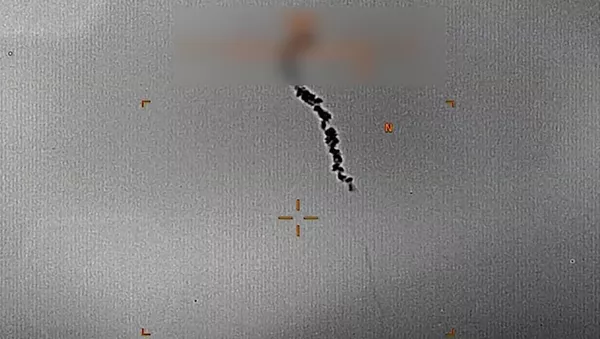An Iranian general warned on Saturday that any action against Tehran would have serious consequences for US interests in the region, the Tasnim News Agency reports.
"Firing one bullet towards Iran will set fire to the interests of America and its allies. Today, the situation in the region is to Iran's advantage. If the enemy - especially America and its allies in the region - make the military mistake of shooting the powder keg on which America's interests lie, the region will be set on fire", armed forces general staff spokesman Brigadier General Abolfazl Shekarchi told the news agency.
Shekarchi's stark warning follows a revelation by US President Donald that he stopped an operation against three sites in Iran 10 minutes before it was set to be carried out upon learning that some 150 Iranians would die in the attack.
....On Monday they shot down an unmanned drone flying in International Waters. We were cocked & loaded to retaliate last night on 3 different sights when I asked, how many will die. 150 people, sir, was the answer from a General. 10 minutes before the strike I stopped it, not....
— Donald J. Trump (@realDonaldTrump) 21 июня 2019 г.
His decision was made shortly after Iran's Islamic Revolutionary Guard Corps (IRGC) announced that they had downed a US Northrop Grumman RQ-4 Global Hawk spy drone flying over the coastal Hormozgan Province, claiming that it had violated the country's airspace. Meanwhile, the US Central Command said that the unmanned aerial vehicle was shot down while flying over international waters in the Strait of Hormuz.
#Iran releases first photos of debris of US #GlobalHawk #RQ4 spy drone shot down by Iranian missile over its airspace in #seaofoman. pic.twitter.com/nnEjyDX2KG
— Hamid Reza (@hamid3663) 21 июня 2019 г.
At the time, IRGC Commander-in-Chief, Major General Hossein Salami, described the downing of the drone as a "clear message" to Washington that Tehran would "react strongly" to any aggression.
Iranian Airspace 'Fully Safe and Secure'
In a parallel development, Iran's Civil Aviation Organisation said that the country's airspace is "fully safe and secure" and open to flights of all airlines, according to the Tasnim News Agency.
"Iran-controlled airspace over the Persian Gulf and other flight routes are completely safe", spokesperson Reza Jafarzadeh was cited as saying.
The comments follow confirmation by at least half-a-dozen airlines that they will restrict flights over airspace in and around the Strait of Hormuz and the Gulf of Oman as tensions between the United States and Iran have reached a fever pitch.
The Federal Aviation Administration (FAA) banned American-registered aircraft from flying in the area in an emergency order on Thursday, citing the risk of "miscalculation and misidentification".
The US aviation regulator claimed that the closest civilian plane was flying some 45 nautical miles from the US surveillance drone brought down by Iran, and multiple other airliners were flying in the area at the same time.
Likewise, United Airlines announced it temporarily suspended India-bound flights to carry out a "thorough safety and security review."
Several major European airlines, including Dutch flag carrier KLM, British Airways, and Germany's Lufthansa stated that they would follow the guidelines, although a Lufthansa spokesman confirmed that flights to Tehran will proceed as scheduled. Air France, for its part, said that it does not carry out flights in the Strait of Hormuz area.
The Abu-Dhabi-based Etihad airline, meanwhile, said it was suspending operations through Iranian airspace over the Strait of Hormuz and the Gulf of Oman after studying the FAA's advice.
Australia's Qantas and Malaysian Airlines, in turn, said that they would avoid the area and change flight paths.
Simmering Tensions
The drone's downing comes against the backdrop of mounting tensions in the region. Relations between the US and Iran were exacerbated in May 2018, when Trump pulled out from the 2015 nuclear deal and reinstated sanctions against Tehran.
They, however, took a dramatic turn last month after the US deployed an aircraft carrier strike group and a bomber task force to the Middle East to send a "clear and unmistakable message" to Iran that any attack on American interests or those of its allies would be met with "unrelenting force".
The Islamic Republic, for its part, announced last month - exactly one year after the unilateral US withdrawal from the nuclear deal - that it would scale back on some of its voluntary commitments under the treaty, but emphasised at the same time that it is not interested in pursuing nuclear weapons.
Already poor relations further deteriorated earlier this month following sabotage attacks on oil tankers in the Gulf of Oman, which Washington and some of its allies immediately blamed on Tehran. The Iranian side has strongly denied the allegations and urged the US to stop "warmongering" and false flag ops in the region.
Days after the incident, the Pentagon green-lit the dispatching of an additional 1,000 troops to the Middle East, following the deployment of the carrier group and bomber task force.




